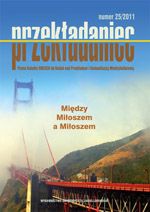Albowiem nie mamy tu miasta trwającego, ale przyszłego szukamy. Przyjaciele złączeni wygnaniem: o korespondencji Czesława Miłosza z Thomasem Mertonem
FOR HERE HAVE WE NO CONTINUING CITY, BUT WE SEEK ONE TO COME. FRIENDS UNITED BY EXILE: ON THE CORRESPONDENCE OF CZESŁAW MIŁOSZ AND THOMAS MERTON
Author(s): Jean WardSubject(s): Language and Literature Studies
Published by: Wydawnictwo Uniwersytetu Jagiellońskiego
Keywords: Miłosz-Merton correspondence; exile; spiritual homelessness; writing in a foreign language; Miłosz’s English
Summary/Abstract: This article considers the decade-long correspondence of Czesław Miłosz and Thomas Merton, published first in a Polish translation in 1991, and only later, in 1997, in the original English. Though Merton offered to write in French, a language that Miłosz at the time knew much better than English, Miłosz chose to use the latter. The article concentrates on Miłosz’s side of the correspondence, comparing the impression of struggle and incomplete command that his letters evoke in the original version with the linguistic elegance and control implied by the Polish translation. Miłosz’s slightly foreign English seems a reflection of the theme implied by the English title of the correspondence, Striving Towards Being. The article also suggests that writing in English, despite the constraints that it imposed, enabled the Polish poet to discover a childlike freedom of expression and to meet his “correspondent”, a fellow-sufferer from spiritual homelessness, in sympathetic understanding, though the external experience of the two was very different. Each partner, searching for someone who “spoke the same language”, found his interlocutor, paradoxically, in a person who, in the literal sense, did not.
Journal: Przekładaniec.
- Issue Year: 2011
- Issue No: 25
- Page Range: 177-188
- Page Count: 12
- Language: Polish

